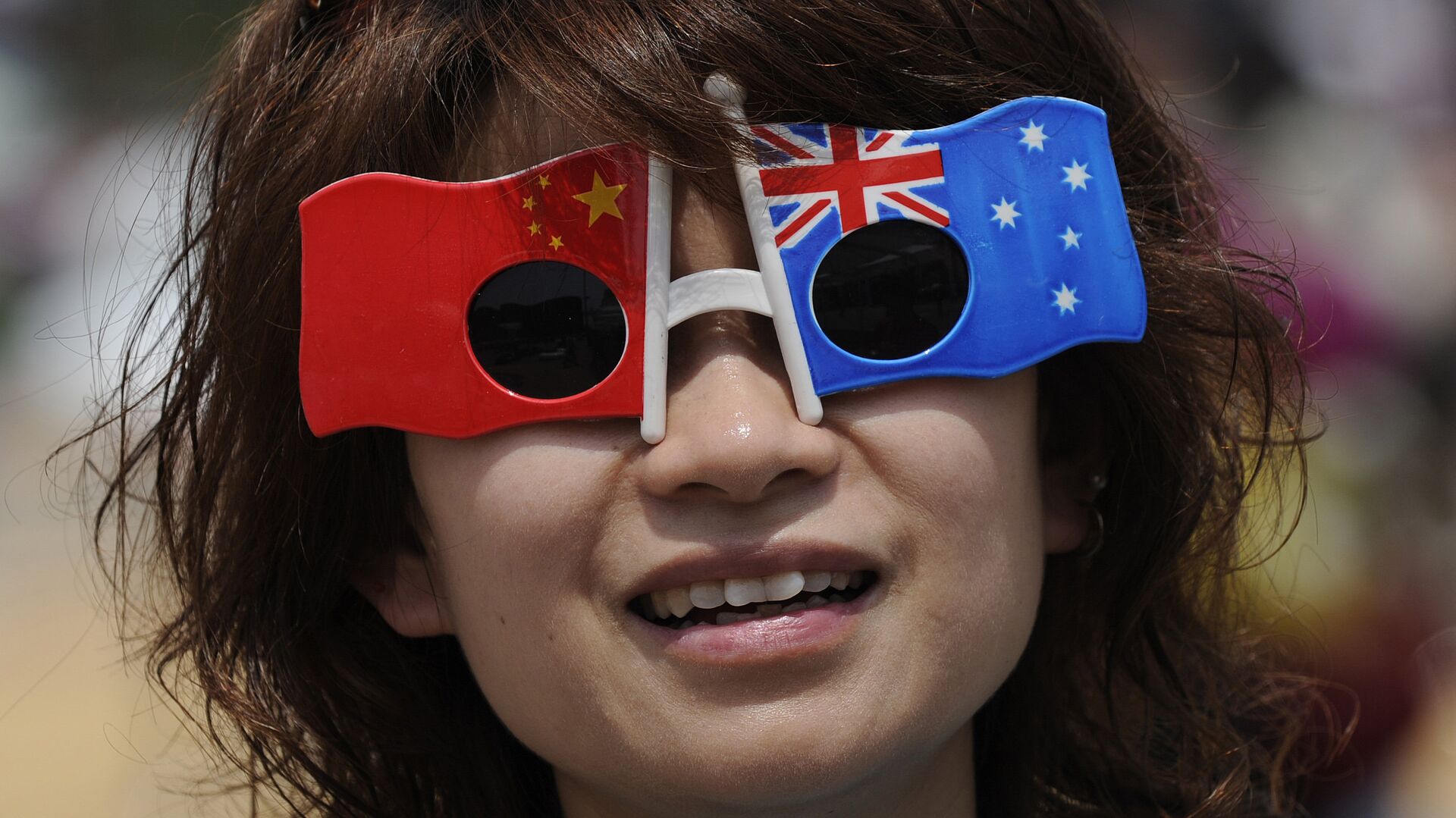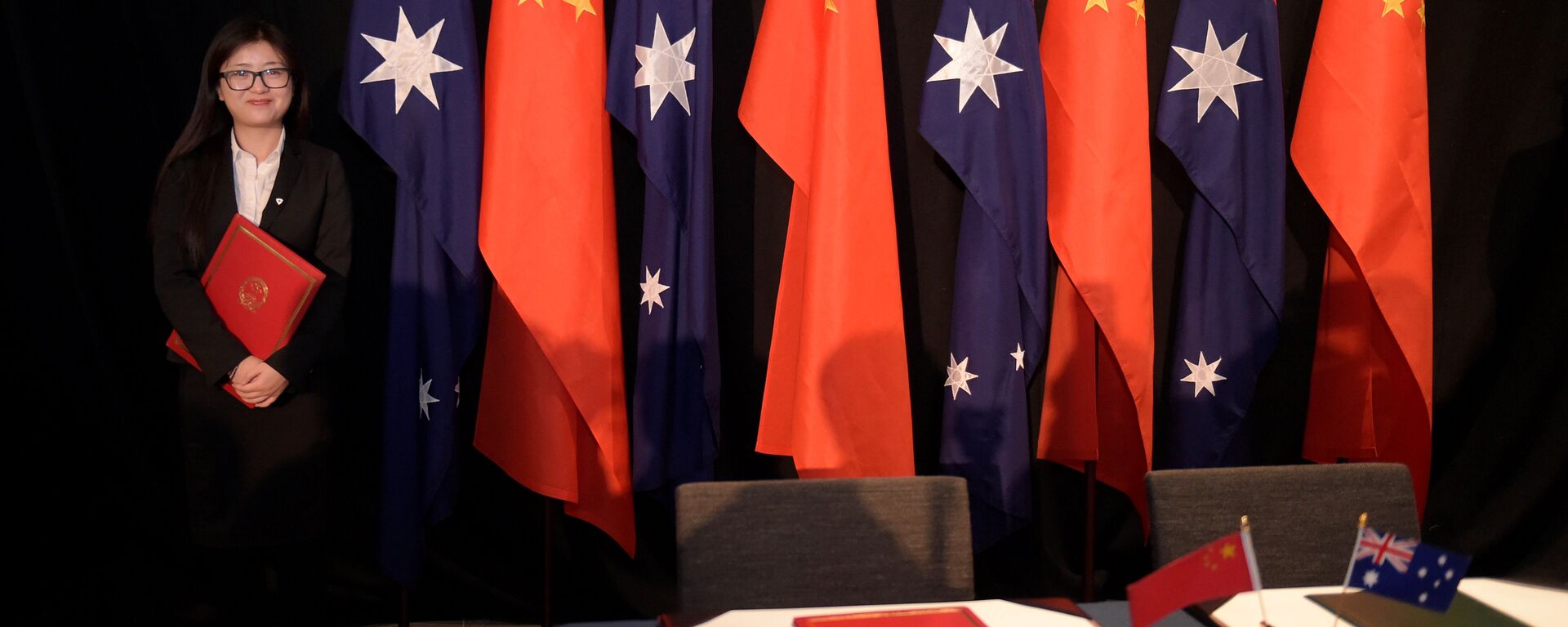https://sputnikglobe.com/20220711/anthony-albanese-ignores-beijings-proposals-aimed-to-get-australia-china-ties-back-on-track-1097177188.html
Anthony Albanese Ignores Beijing’s Proposals Aimed to Get Australia-China Ties ‘Back on Track’
Anthony Albanese Ignores Beijing’s Proposals Aimed to Get Australia-China Ties ‘Back on Track’
Sputnik International
During last week's meeting between Australian and Chinese foreign ministers, Wang Yi blamed the previous Scott Morrison government for “difficulties” in... 11.07.2022, Sputnik International
2022-07-11T09:06+0000
2022-07-11T09:06+0000
2022-10-19T18:35+0000
australia
china
anthony albanese
asia
https://cdn1.img.sputnikglobe.com/img/102015/76/1020157640_0:485:2836:2080_1920x0_80_0_0_35e4617b677cafa8268af093ef33e681.jpg
Australian Prime Minister Anthony Albanese on Monday remained non-committal on suggestions proposed by China geared towards “improving” bilateral relations between Beijing and Canberra."Look, Australia doesn't respond to demands. We respond to our own national interest. I'll say this. We will cooperate with China where we can," Albanese said at a press conference in Canberra.Albanese described the meeting between the two foreign ministers as a “constructive” engagement and “just a step forward.”The Australian leader added that Canberra hasn’t “changed” its position on any issue and that his government would “continue to be constructive” in its dealings with Beijing.The meeting between Australian Foreign Minister Penny Wong and her Chinese counterpart Wang Yi on the sidelines of G20 Foreign Ministers’ Meeting in Bali on November 8 was the first face-to-face engagement between the two countries' foreign ministers in around three years.Wang asked Wong to consider some suggestions to improve bilateral relations.Economic and political ties between Canberra and its largest trading partner Beijing have been particularly strained since former Australian Prime Minister Scott Morrison, who lost the federal election in May, called for an independent probe into the origins of the COVID pandemic, a demand which riled up Beijing.In response, Beijing imposed sanctions on Australian imports including coal, barley and wine. Last September, China reacted angrily to Australia’s membership of the AUKUS pact, under which Canberra would get access to American and British technology to develop nuclear attack submarines (SSNs).Then in April, Canberra and its treaty allies the US and New Zealand expressed concerns over the unveiling of the China-Solomon Islands security cooperation agreement. Canberra and its Western allies have also been concerned about Beijing’s outreach towards the smaller Pacific Island Nations (PINs) as well as its growing influence in the neighborhood.Beijing has said that it is ready to carry out tripartite and quadrilateral partnerships in the South Pacific region with Australia and New Zealand to achieve “win-win outcomes”, a point Wang reiterated at the meeting in Bali.A release by Australia’s Department of Foreign Affairs and Trade (DFAT) on November 8 after the meeting in Bali said that it was in “our countries’ interests for the relationship to be stabilized”.“Australia and China have gained much through the strength of our economic and people-to-people ties,” the Australian statement said.
https://sputnikglobe.com/20220708/australia-china-discuss-regional-security-stability-on-g20-sidelines-1097115110.html
australia
china
Sputnik International
feedback@sputniknews.com
+74956456601
MIA „Rossiya Segodnya“
2022
News
en_EN
Sputnik International
feedback@sputniknews.com
+74956456601
MIA „Rossiya Segodnya“
Sputnik International
feedback@sputniknews.com
+74956456601
MIA „Rossiya Segodnya“
australia, china, anthony albanese
australia, china, anthony albanese
Anthony Albanese Ignores Beijing’s Proposals Aimed to Get Australia-China Ties ‘Back on Track’
09:06 GMT 11.07.2022 (Updated: 18:35 GMT 19.10.2022) During last week's meeting between Australian and Chinese foreign ministers, Wang Yi blamed the previous Scott Morrison government for “difficulties” in bilateral ties in recent years. However, he commended the new Australian government for “re-affirming” its commitment to stabilizing relations and urged it to take “concrete” steps to improve ties.
Australian Prime Minister Anthony Albanese on Monday remained non-committal on suggestions proposed by China geared towards “improving” bilateral relations between Beijing and Canberra.
"Look, Australia doesn't respond to demands. We respond to our own national interest. I'll say this. We will cooperate with China where we can," Albanese said at a
press conference in Canberra.
Albanese described the meeting between the two foreign ministers as a “constructive” engagement and “just a step forward.”
The Australian leader added that Canberra hasn’t “changed” its position on any issue and that his government would “continue to be constructive” in its dealings with Beijing.
The
meeting between Australian Foreign Minister Penny Wong and her Chinese counterpart Wang Yi on the sidelines of G20 Foreign Ministers’ Meeting in Bali on November 8 was the first face-to-face engagement between the two countries' foreign ministers in around three years.
Wang asked Wong to consider some suggestions to improve bilateral relations.
“First, stick to regarding China as a partner rather than a rival. Second, stick to the way we get along with each other, which features seeking common ground while reserving differences. Third, stick to not targeting any third party or being controlled by any third party. Fourth, stick to building positive and pragmatic social foundations and public support,” Wang told Wong, according to the Chinese Foreign Ministry.
Economic and political ties between Canberra and its largest trading partner Beijing have been particularly strained since former Australian Prime Minister Scott Morrison, who lost the federal election in May, called for an independent probe into the origins of the COVID pandemic, a demand which riled up Beijing.
In response, Beijing imposed sanctions on Australian imports including coal, barley and wine.
Last September, China reacted angrily to Australia’s membership of the AUKUS pact, under which Canberra would get access to American and British technology to develop nuclear attack submarines (SSNs).
Then in April, Canberra and its treaty allies the US and New Zealand expressed concerns over the unveiling of the China-Solomon Islands security cooperation agreement.
Canberra and its Western allies have also been concerned about Beijing’s outreach towards the smaller Pacific Island Nations (PINs) as well as its growing influence in the neighborhood.
Beijing has said that it is ready to carry out tripartite and quadrilateral partnerships in the S
outh Pacific region with Australia and New Zealand to achieve “win-win outcomes”, a point Wang reiterated at the meeting in Bali.
A release by Australia’s Department of Foreign Affairs and Trade (DFAT) on November 8 after the meeting in Bali said that it was in “our countries’ interests for the relationship to be stabilized”.
“Australia and China have gained much through the strength of our economic and people-to-people ties,” the Australian statement said.



